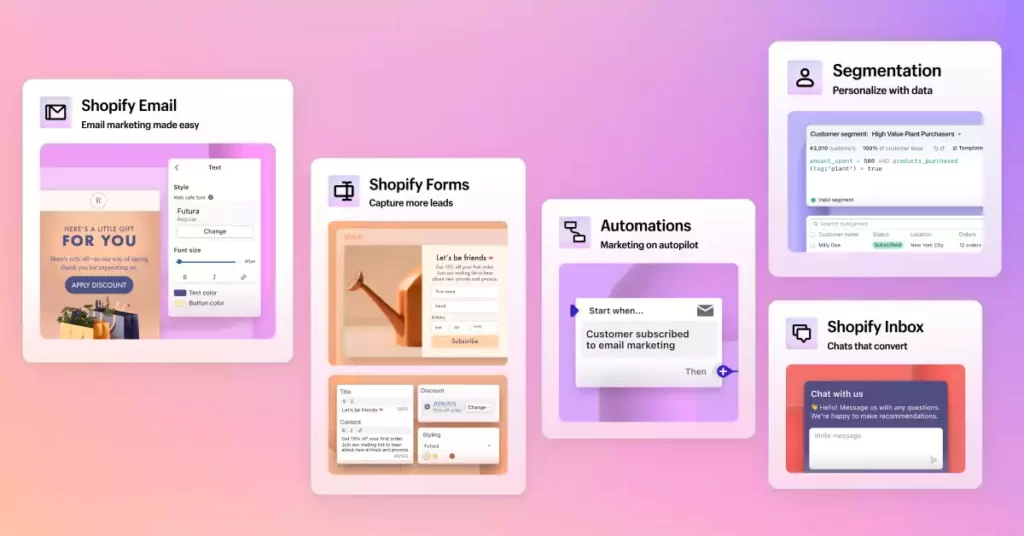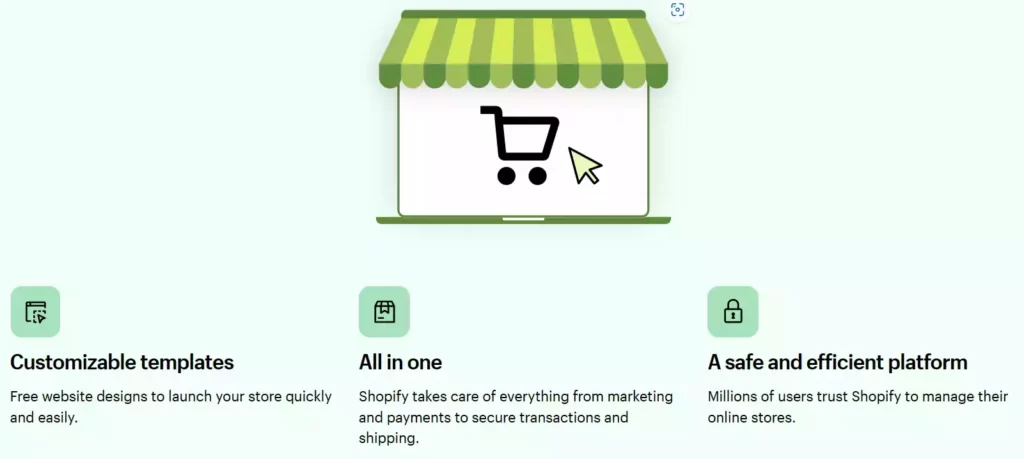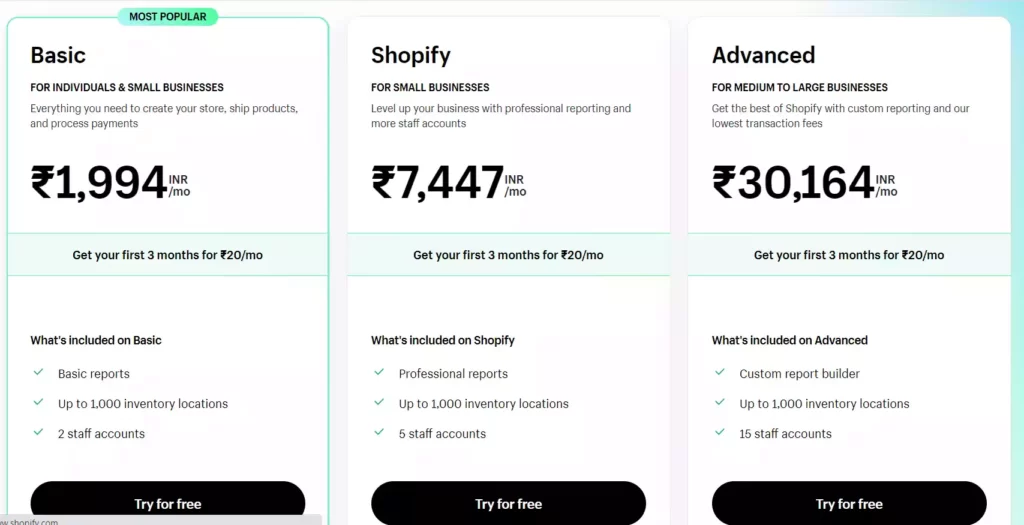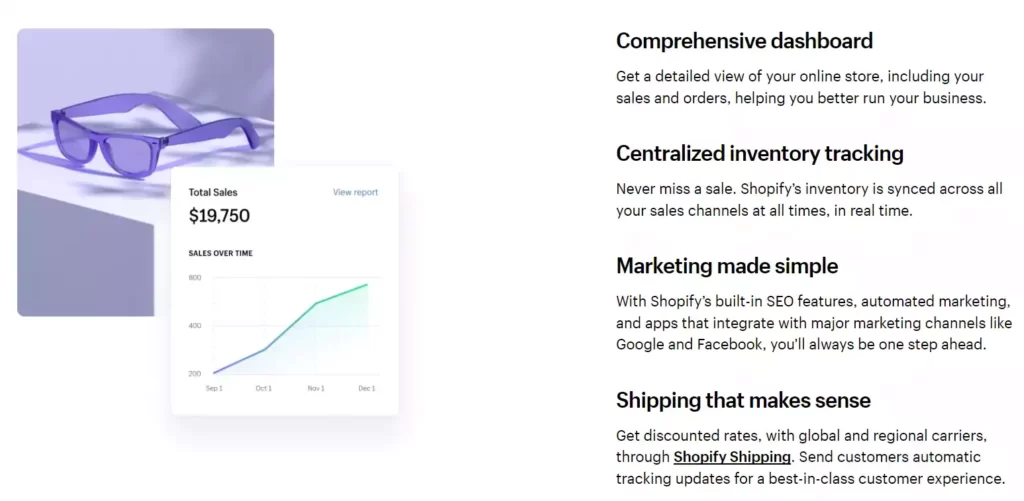In the fast-paced digital era, commerce has significantly shifted toward online platforms.
As online sellers, drop-shipping solutions, and small businesses seek efficient ways to sell their products and services, Shopify emerges as a leading player in the eCommerce realm.
This review will take you on an exciting journey into the realm of Shopify, exploring its features, benefits, and potential drawbacks.
So buckle up as we embark on a detailed exploration of the Shopify platform and how it can revolutionize your online business.
Table of Contents
What is Shopify?
Shopify is a complete e-commerce solution that allows small businesses, sole proprietors, and medium-sized businesses to easily create and manage online stores.
Founded in 2006, Shopify has rapidly grown into a robust and versatile platform, powering over a million businesses worldwide.
Whether you’re a passionate entrepreneur with a niche product or an established brand looking to expand online, Shopify provides all the tools and resources you need to set up, customize, and scale your online store.
From its user-friendly interface to its extensive app ecosystem, Shopify offers an inclusive package for users of all technical backgrounds.
You don’t need to be a coding expert to craft a stunning storefront and start selling your products or services.
Shopify’s intuitive drag-and-drop interface simplifies the entire process, making it accessible to even those with minimal technical experience.
Shopify: Free or Paid?
When it comes to pricing, Shopify operates on a subscription-based model.
While the platform offers a 14-day free trial for users to explore its features, it eventually requires a paid plan to continue using it for your business needs. Shopify’s free trial duration changes from time to time.
The subscription plans come in various tiers, catering to businesses of all sizes.
The basic Shopify plan is suitable for beginners and small businesses, providing essential features to get started.
As your business grows, you can upgrade to higher-tier plans, such as Shopify Advanced or Shopify Plus, unlocking more advanced functionalities.
The platform’s scalability makes it an attractive option for businesses with long-term growth objectives.
Why is Shopify So Famous?
Shopify’s popularity can be attributed to several factors that set it apart from its competitors.
First and foremost, Shopify is renowned for its reliability and stability. As an online seller, the last thing you want is an unstable platform that crashes during peak sales.
With Shopify’s robust infrastructure and secure hosting, you can rest assured that your online store will remain accessible and functional at all times.
Moreover, Shopify’s reputation for exceptional customer support adds to its appeal.
The platform offers 24/7 customer assistance, promptly addressing any concerns or queries you may have.
Whether you’re a novice or an experienced eCommerce entrepreneur, having reliable support to rely on is invaluable.
Main Activities of Shopify
Shopify encompasses many features and activities designed to streamline the eCommerce experience.
One of its primary functions is product management. Adding, updating, and organizing your products is a breeze with Shopify’s straightforward interface. You can upload product images, write compelling descriptions, and manage inventory levels effortlessly.
Another vital activity within Shopify is order processing. The platform simplifies the entire order fulfillment process, allowing you to seamlessly track orders, manage shipping, and handle returns.
This gives you more time to focus on other aspects of your business.
Additionally, Shopify integrates with various payment gateways, offering secure and smooth transactions for your customers.
You can choose from an array of payment options that cater to the preferences of your target audience.
Success Factors of Shopify
Shopify’s success can be attributed to several key factors contributing to its continued growth and popularity.
One such factor is its thriving community of users and experts.
The Shopify community serves as a support system for entrepreneurs, offering a space to connect, collaborate, and share knowledge.
Whether through forums, social media groups, or meetups, the community fosters an environment of learning and growth.
Furthermore, Shopify’s app ecosystem plays a significant role in its success.
The Shopify App Store is a treasure trove of apps and plugins that extend the platform’s functionality.
Whether you need to optimize your store for search engines, enhance the customer experience, or integrate with third-party services, an app can likely meet your requirements.
Unique Features of Shopify
Shopify boasts unique features that make it stand out from other eCommerce platforms.
One of its notable advantages is its mobile responsiveness. In the era of mobile browsing, having a website that adapts seamlessly to various devices is crucial.
Shopify’s responsive themes ensure your store looks visually appealing and optimizes on smartphones, tablets, and desktops.
Another standout feature is Shopify’s built-in SEO tools. Search engine optimization is pivotal in driving organic traffic to your online store.
Shopify’s SEO features enable you to optimize meta tags, URLs, and image alt texts, among other elements.
This helps search engines better understand your store’s content, improving its ranking in search results.
Moreover, Shopify’s integration with various social media platforms opens up new avenues for marketing and sales.
You can connect your store to Facebook, Instagram, and other channels, enabling you to reach a broader audience and promote your products effectively.
Shopify vs. WooCommerce: A Comparison
As with any decision, choosing the right eCommerce platform involves understanding its strengths and limitations compared to alternatives.
One of Shopify’s primary competitors is WooCommerce, a plugin for WordPress.
While both platforms are popular choices for online sellers, they cater to different user preferences and business requirements.
Shopify is a hosted solution, meaning the platform handles hosting and technical aspects for you.
This benefits users who want a hassle-free experience without worrying about server management.
On the other hand, WooCommerce is self-hosted, which requires users to manage their hosting and security.
This gives users greater control over their websites, but it comes with the responsibility of maintaining technical aspects.
In terms of ease of use, Shopify has the upper hand for beginners.
Its intuitive interface and drag-and-drop capabilities make it accessible to those with little technical background.
In contrast, WooCommerce may require some familiarity with WordPress and basic technical knowledge.
Regarding cost, Shopify’s subscription plans cover hosting and technical support, simplifying budgeting for your online store.
WooCommerce, being a plugin, is free to install but may incur costs for hosting, domain registration, and premium themes or plugins.
Pros of Using Shopify
Choosing Shopify as your eCommerce platform has numerous advantages, making it a popular choice among businesses.
Here are some of the key pros of using Shopify:
User-Friendly Interface: Shopify’s intuitive interface makes it easy for anyone to create and manage an online store without coding expertise.
Customer Support: The 24/7 customer support ensures that help is always available whenever needed.
Secure and Reliable: Shopify’s secure hosting and regular backups provide you and your customers peace of mind.
Extensive App Ecosystem: The Shopify App Store offers a wide array of apps and plugins, enabling you to easily add features and functionalities to your store.
Mobile Responsiveness: As more people switch to mobile devices for online shopping, Shopify’s responsiveness ensures an optimal user experience across devices.
Cons of Using Shopify
While Shopify is a well-rounded platform, it’s essential to consider its potential drawbacks:
Limited Customization: While Shopify provides various themes and templates, extensive customization might require some coding or the assistance of a developer.
Transaction Fees: Depending on your chosen payment gateway, additional transaction fees may apply, affecting your overall profit margins.
Dependency on Third-Party Apps: To access certain features, you may need to rely on third-party apps, which can add to your overall expenses.
Real-World Use Cases
Shopify’s versatility and ease of use have led to widespread adoption across diverse industries. Let’s explore some real-world use cases of businesses successfully leveraging Shopify:
Fashion Boutiques: Fashion entrepreneurs have found Shopify an excellent platform to showcase their collections and reach a global audience.
Beauty Brands: Shopify’s ease of use makes it ideal for beauty brands to showcase their products and engage with customers.
Tech Startups: Tech startups benefit from Shopify’s scalability, allowing them to grow their online stores alongside their businesses.
Handmade Goods Sellers: Shopify’s customizable themes and intuitive interface cater well to sellers of unique and handmade products.
Clarifying Technical Terms
In eCommerce, you might come across technical terms and concepts that can confuse beginners. To ensure a smooth journey, let’s clarify some of these terms:
SSL Certificate: An SSL certificate ensures that data transmitted between your customers’ browsers and your website remains encrypted and secure.
Payment Gateway: A payment gateway is a service that allows you to accept online payments securely.
SEO (Search Engine Optimization): SEO refers to optimizing your website to rank higher in search engine results, driving organic traffic to your store.
Conclusion
In conclusion, Shopify is a powerhouse in the eCommerce world, empowering individuals and businesses to embark on successful online ventures.
Its user-friendly interface, reliability, and extensive features make it a top choice for online sellers, drop shipping solutions, and small businesses.
While there may be some limitations, Shopify’s benefits far outweigh them, ensuring a smooth and rewarding eCommerce journey for all.
So, if you’re ready to take your business to the next level, consider joining the Shopify community and unleashing the power of eCommerce.
FAQs (Frequently Asked Questions)
What is the cost of using Shopify?
The cost of using Shopify depends on the subscription plan you choose. It offers various tiers with different features, ranging from basic to advanced. Additionally, transaction fees may apply, depending on the payment gateway used.
Can I sell products on Shopify without a physical store?
Absolutely! Shopify is designed for online businesses, allowing you to sell products without needing a physical storefront. It enables you to reach a global audience and conduct business entirely online.
Does Shopify offer built-in SEO tools?
Yes, Shopify has built-in SEO tools that empower you to optimize your store for search engines. This helps improve your store’s visibility and attract organic traffic.
Can I use my domain name with Shopify?
Yes, you can use your domain name with Shopify. Whether you already have a domain or need to purchase one, Shopify allows you to connect it seamlessly to your online store.
Is there a limit to the number of products I can sell on Shopify?
Shopify offers various plans with different product limits. However, even the basic plan allows you to sell many products. You can upgrade to a higher-tier plan if you need more product listings.
With Shopify, you hold the key to a world of possibilities in eCommerce. So why wait? Start building your dream online store with Shopify today!









